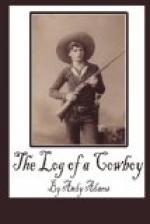The next morning, before we reached the agency, a number of gaudily bedecked bucks and squaws rode out to meet us. The arrival of the herd had been expected for several weeks, and our approach was a delight to the Indians, who were flocking to the agency from the nearest villages. Physically, they were fine specimens of the aborigines. But our Spanish, which Quarternight and I tried on them, was as unintelligible to them as their guttural gibberish was to us.
Lovell and the agent, with a detachment of the cavalry, met us about a mile from the agency buildings, and we were ordered to cut out the cows. The herd had been grazed to contentment, and were accordingly rounded in, and the task begun at once. Our entire outfit were turned into the herd to do the work, while an abundance of troopers held the herd and looked after the cut. It took about an hour and a half, during which time we worked like Trojans. Cavalrymen several times attempted to assist us, but their horses were no match for ours in the work. A cow can turn on much less space than a cavalry horse, and except for the amusement they afforded, the military were of very little effect.
After we had retrimmed the cut, the beeves were started for their pasture, and nothing now remained but the counting to complete the receiving. Four of us remained behind with the cows, but for over two hours the steers were in plain sight, while the two parties were endeavoring to make a count. How many times they recounted them before agreeing on the numbers I do not know, for the four of us left with the cows became occupied by a controversy over the sex of a young Indian—a Blackfoot—riding a cream-colored pony. The controversy originated between Fox Quarternight and Bob Blades, who had discovered this swell among a band who had just ridden in from the west, and John Officer and myself were appealed to for our opinions. The Indian was pointed out to us across the herd, easily distinguished by beads and beaver fur trimmings in the hair, so we rode around to pass our judgment as experts on the beauty. The young Indian was not over sixteen years of age, with remarkable features, from which every trace of the aborigine seemed to be eliminated. Officer and myself were in a quandary, for we felt perfectly competent when appealed to for our opinions on such a delicate subject, and we made every endeavor to open a conversation by signs and speech. But the young Blackfoot paid no attention to us, being intent upon watching the cows. The neatly moccasined feet and the shapely hand, however, indicated the feminine, and when Blades and Quarter-night rode up, we rendered our decision accordingly. Blades took exception to the decision and rode alongside the young Indian, pretending to admire the long plaits of hair, toyed with the beads, pinched and patted the young Blackfoot, and finally, although the rest of us, for fear the Indian might take offense and raise trouble, pleaded with him to desist, he called the youth his “squaw,” when the young blood, evidently understanding the appellation, relaxed into a broad smile, and in fair English said, “Me buck.”




